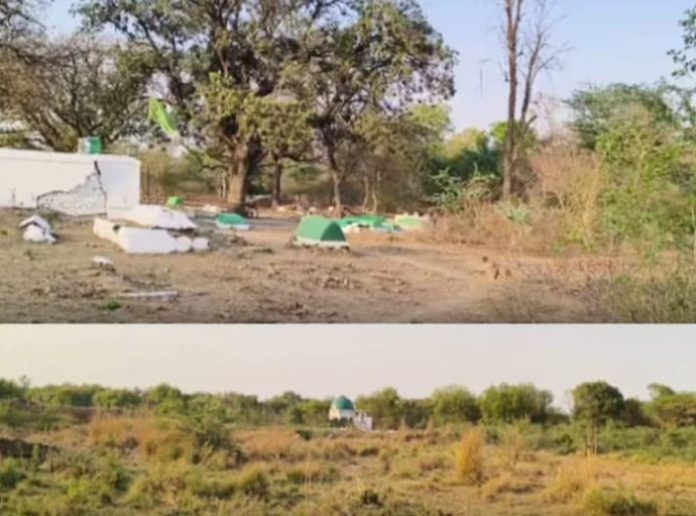– Akhilesh Tripathi
Lucknow: In the Kaushambi district of Uttar Pradesh, the Yogi Adityanath-led BJP government has seized 58 acres of land belonging to the Waqf Board, registering it as government property in official records. This action marks the beginning of a larger state-level campaign to assert ownership over properties held by the Waqf Boards across Uttar Pradesh, following the enactment of the Waqf (Amendment) Act 2025.
Kaushambi district houses 413 Waqf properties across the tehsils of Sirathu, Manjhanpur, and Chail, covering a total of approximately 98.95 hectares. These properties, which belong to both Shia and Sunni Waqf Boards, include graveyards, mosques, and madrasas. However, the state government claims that over 80% of these lands are actually government property. This dispute stems from discrepancies between Waqf Board records and government revenue records, with many properties not having undergone the formal legal mutation process necessary to be officially recognised as Waqf land.
The controversy over Waqf properties intensified when the Joint Parliamentary Committee (JPC) on the Waqf (Amendment) Bill uncovered a significant mismatch between Waqf Board entries and official government records. Acting on this, the UP government directed District Magistrates to submit detailed reports on Waqf properties in their regions. This led to the identification of large tracts of land that, though managed and claimed by Waqf Boards, were not legally recorded as such in the government books.
Taking the lead, the Kaushambi district administration moved swiftly under state orders to seize 58 acres (93 bighas) of Waqf land in the Kada Dham area of Sirathu tehsil. This land, located in the jurisdiction of the Dara Nagar Nagar Panchayat, has been formally registered as government property. Although the takeover is currently limited to record changes, local BJP leaders have already begun planning development projects for the land.
Ragini Kesrwani, Chairperson of Dara Nagar Nagar Panchayat, has started drafting proposals for the land’s use. Her representative, Arun Kumar Kesrwani, stated that once the land is officially handed over to the Nagar Panchayat, it will be transformed into an industrial zone to establish factories and create employment opportunities.
Kesrwani said: “At present, the Waqf properties registered with the Waqf Boards have been recorded as government land in the official records. When the government hands this land over to the Nagar Panchayat, it will be utilized. An industrial area will be developed on this land, and factories will be established, which will generate employment for people.”
The district administration has also submitted data on Waqf properties in Manjhanpur and Chail tehsils to the state government and is awaiting further directives before proceeding with similar actions there. District Magistrate Madhusudan Hulgi confirmed that an investigation was carried out in all three tehsils, identifying 98.95 hectares of land under Waqf Board possession. According to him, these plots are officially recorded in the Khatauni (land register) as graveyards, madrasas, or Gram Sabha. The administration reclaimed the Sirathu land and registered it as government property and has reported the remaining findings to the state government, pending further instructions.
However, the timing and urgency of the administration’s action in Sirathu remain unexplained. The move is especially controversial because the new Waqf law is currently under review by the Supreme Court of India, which has ordered that no action be taken on Waqf properties until the court delivers a verdict. Despite this, the Uttar Pradesh government has moved forward, effectively bypassing the court’s directive by registering Waqf Board lands as state-owned.
This aggressive move has sparked serious concerns among the Muslim community and opposition parties. Many had previously warned that the Waqf Amendment Law could be misused by the BJP government to seize Waqf properties. The takeover of Waqf lands in Kaushambi is being seen as a signal that Waqf properties across Uttar Pradesh are no longer safe. The actions of the BJP-led state government have reinforced longstanding fears that the new law is a vehicle for dispossessing Muslims of their community assets under the guise of administrative correction.




